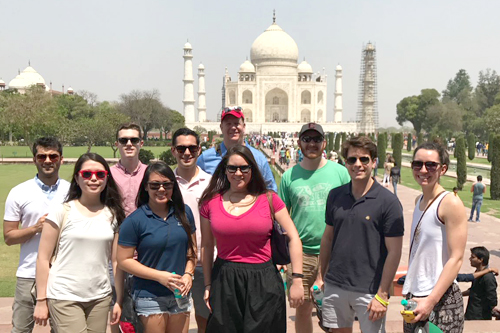This website uses cookies
We use cookies to ensure that we give you the best experience on our website. If you continue to use this site we will assume that you are happy with it.
The United States, in particular California, is home to one of the world’s largest surrogacy industries. Yet, some states in the United States refuse to enforce contracts between intended parents and surrogates. Advocates in the state of New York are currently working to legalize compensated surrogacy. Meanwhile, half a world away, India’s parliament is considering banning the practice. Contributing to these discussions are students in Cornell’s International Human Rights Clinic.
 This semester, the clinic has been collaborating with the Transnational Human Rights Seminar at the National Law University in Delhi (NLU-Delhi). Cornell Law’s Sital Kalantry has joined NLU-Delhi professors Aparna Chandra and Mrinal Satish in creating a “global classroom” where their students can collaborate in studying surrogacy from a transnational and comparative legal perspective. Since the end of January, students from both universities have engaged in class discussions through sophisticated videoconferencing technology.
This semester, the clinic has been collaborating with the Transnational Human Rights Seminar at the National Law University in Delhi (NLU-Delhi). Cornell Law’s Sital Kalantry has joined NLU-Delhi professors Aparna Chandra and Mrinal Satish in creating a “global classroom” where their students can collaborate in studying surrogacy from a transnational and comparative legal perspective. Since the end of January, students from both universities have engaged in class discussions through sophisticated videoconferencing technology.
Kalantry, clinical professor of law, notes that legal clinics develop lawyering skills such as interviewing, legal research, and legal writing. While some clinics focus on direct services to indigent clients, the joint surrogacy clinic has examined how to develop larger policy solutions to transnational issues. She says, “It is a rewarding experience for students to learn how to develop solutions to real-world policy problems using extensive secondary research and primary field data.”
Over spring break, students in Cornell’s International Human Rights Clinic traveled to New Delhi to conduct fieldwork alongside their NLU-Delhi counterparts. The students interviewed a variety of stakeholders, including women who work as surrogates, fertility doctors, feminist scholars, non-profit organizations, and government officials.
The students’ work may have implications for surrogacy policy in both India and the United States. In response to a call by the Indian Parliament, Professors Chandra and Satish submitted a memo of the students preliminary findings to the standing committee in parliament that is currently reviewing the Indian surrogacy bill. Under the supervision of their professors, clinic participants will now produce a report that synthesizes their desk research and fieldwork with the goal of providing relevant information to the Indian Parliament as it deliberates on the Surrogacy Bill of 2016.
“Once the full report is ready, we plan to disseminate it widely with the hope that it shapes future discussions on the issue” says Professor Aparna Chandra, an NLU-Delhi law professor who was co-teaching the class.
Additionally, a team of students in the joint class has interviewed compensated-surrogacy stakeholders in the United States and will produce a legislative policy report on the Child-Parent Security Act, a bill legalizing compensated surrogacy, which is in committee in the New York legislature.
Jaeeun Shin ’18 reflects on the most exciting aspects of the clinic: “I’d say it’s a tie between getting to travel all over India and interview the many actors involved in surrogacy and getting to participate in creating a policy report that may affect many, many people in the future.
“I think this was a tremendous opportunity for growth and exposure to different cultures and viewpoints, with a good mix of theory, law, and policy. It was a truly collaborative research project, with almost twenty students and instructors and teaching assistants from opposite sides of the globe meeting weekly. I look forward to the next opportunity I may have to work on a project on a similar scale and scope. I enjoyed giving back to the community in small ways through our research and writing, and definitely want to continue taking part in meaningful pro bono projects throughout my career!”
“It was a life-changing experience,” says Shannon Nakamoto ’18. “Being in India and speaking directly to those involved in the surrogacy process allowed me to understand how they viewed the ethical issues in light of their social and economic circumstances. After speaking with the surrogates (those most affected by our policy paper), I realized that the ethical issues (which my portion of the research deals with) are much more complex than I originally thought and that, when making any recommendations, I would need to remember to incorporate the views of the surrogates, rather than forcing my outsider’s perspective on their future laws.”
She adds, “The experience was rewarding because we got to know students from India on both a professional and personal level. While we were in India, our NLU teammates took us around to their favorite restaurants, shops, and sights. I really enjoyed the experience and have found that it has helped me expand my legal network and create lasting friendships.”